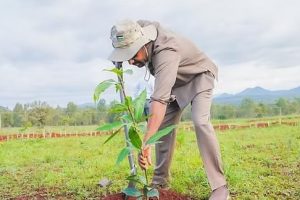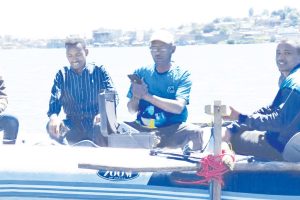
Following the political reform that took place in 2018, planting and caring for tree seedlings have been becoming a culture for many Ethiopians. The government has taken planting tree seedlings as one of its priorities for national development goals. It has also capitalized to make planting tree seedlings the concern of every citizen.
Ethiopia, more importantly, launched a national green legacy initiative in 2019 setting a target of planting 20 billion tree seedlings within four years. In order to achieve the target set, the country has started the national green legacy campaign thereby increasing its forest coverage to 30 percent within 10 years.
Prime Minister Abiy Ahmed (PhD), who also initiator of the programme, explained that a green legacy initiative is the concern of everybody regardless of age, gender, religion, political view, social status, and so on as the green legacy project is imperative to promote eco-tourism and combat climate change impacts.
“As Ethiopians, our lives are strongly intertwined with trees and forests. Hence, implementing green legacy initiatives would help address the consequences of environmental degradation and climate change. Preventing flooding, food insecurity, environment-related conflicts, and other adverse impacts in our hands,” the Premier added.
Indeed, the green legacy initiative that was launched in 2019 aiming to plant 20 billion seedlings in four years has so far been successful. The entire accomplishment has reached 18 billion over the past three years. Most of the seedlings being planted as part of the initiative are indigenous tree species and plants to be used for food.
The green legacy initiative has been hugely contributing to increasing the nation’s vegetation coverage, environmental protection, and conservation efforts.
Ethiopian Biodiversity institute Forest and Rangeland Plants researcher Sisay Alemu told The Ethiopian Herald that the green legacy is a very important initiative to restore the nation’s biodiversity that could be used for food, medication, wood products, beautifying purposes and so on.
Jemal Mohammed (PhD), an economist said that the green legacy initiative has various positive impacts on the country’s economy. Among others, it can be used to preserve soil, water, and other natural resources to protect life in the world. Besides, it is imperative to preserve and rehabilitate nature.
Cognizant of the value and the significance of planting tree seedlings into consideration, the fourth year of green legacy tree seedling preparations has been held both by the Federal and regional governments. According to Prime Minister Abiy, the Green Legacy preparations are currently underway as we gear up for the fourth year’s tree plantation campaign. It is also significant to participate in soil and water protection and conservation as they have a greater contribution l to enhance agricultural productivity.
With increasing pressures on water supplies and topsoil erosion, due to various factors including land degradation, the enhanced Green Legacy efforts aim to address several intertwined issues to ensure agricultural productivity and food security, he added.
Fikreyesus Ashenafi, Natural Resources Development Sector Deputy Head under Sidama State Agriculture and Natural Resources Bureau said that to make this year’s Green legacy plantation program a success, the state has been identified and prepared environmentally friendly seedlings entwined with Environmental Protection and Forest Development Authority. Adequate multi-sectoral plant and fruit seedlings have also been prepared and distributed over 157.98 million seedlings in collaboration with the public, private, community, and individual levels to woredas.
Tree plantation campaigns will be carried out targeting the vision of addressing deforestation and improving soil fertility, he explained.
Though there was a plan of covering 65 to 75 percent of the state with tree seedlings in the Belig seasons, only 23 million seedlings have already been planted due to the lack of rainfall. Hence, the region is working to achieve the plan through monitoring the rainy season and planning to plant more for the upcoming wintergreen legacy campaigns.
What is more, farmers have started planting coffee seedlings in coffee- growing woredas. Since the demand for planting fruits and vegetables have increased, the farmers have taken the initiative to do so. This initiative could be taken as a role model for the development endeavor of the region. All in all, the Sidama region is making preparations to plant 314 million forest and fruit seedlings in 2022.
Southern Nations, Nationalities and People state (SNNPs) Deputy Head for the Natural Resources Sector Andenya Senale on his part noted that the region has prepared more than 450 million seedlings including fruit and coffee assisted with seven nurseries. Hence, the region has achieved 61 percent of its plan.
As this year’s tree planting program mainly focuses on fruit seedlings, it will have a greater contribution in terms of creating more jobs for women and youths as well as raising the income of farmers in general. In order to ensure food security, The state provides 30 fruit seedlings per year. In general, preparations are underway to plant 1.5 billion seedlings in the SNNPR in the 2022 winter seasons.
Ethiopian Minister of Agriculture Minister Umer Hussen said that preparations are well underway to achieve the target in the fourth-year green legacy campaign. The preparation for the fourth year plantation season was started immediately after the completion of the third year’s plantation programme. For this to happen, over 6.7 billion seedlings are in preparation across the country.
Although it planned to plant five billion seedlings in the fourth year campaign which will come into effect soon. The preparation of seedlings is considered the perishability nature of seedlings.
Oromia regional state, for the upcoming winter seasons, has also prepared 1.3 billion coffee seedlings. Oromia Regional Agriculture Bureau Deputy Head Mohamed Sani said that necessary preparations have been made in the coffee-growing zones of Oromia State. Along with coffee seedling plantation, the region has planned to plant 4.8 billion seedlings this green legacy planting year.
In fact, preparing tree seedlings beforehand is imperative for the upcoming fourth-year’s green legacy initiative. Efforts are undertaken by the federal and regional governments, and communities. Nevertheless, the preparation should take into account not only quantity but also the quality and indigenous seedlings into account. The endangered tree species should be also given due attention since they are important food, medication, wood products, beautifying purposes, and so on.
BY EPHREM ANDRAGACHEW
THE ETHIOPIAN HERALD SUNDAY EDITION 22 MAY 2022





